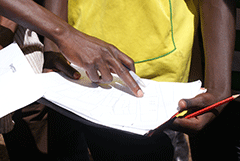This blog post from the Cities Alliance is cross-posted on Meeting of the Minds, an urban knowledge sharing platform based in San Francisco, California
[4 June 2014] -- Cities of all sizes are growing and transforming; in Sub-Saharan Africa and South Asia alone, the urban populations are expected to double over the next 20 years.
Despite major advances in technology, there is little reliable data and recognition on how these urban areas are growing and changing -- who lives in the city, where they came from, where they live, and how they earn a living.
This is especially true for informal neighbourhoods, where the vast majority of urban growth is taking place, and which are often completely off the grid of formal planning and governance processes.
A better knowledge of cities can help bridge the engagement, information and accountability gaps between city governments and their citizens. It can also support good governance and inclusive planning. Here are some of the ways cities and citizens can benefit from Knowing Their City:
1. More effective city planning. Without knowing how many people live in a city and where, it is very difficult for a city to provide services or plan for future growth. Once mayors or city officials have accurate data on the entire city – not just the formal areas – they can make more informed policy choices, such as where to provide services, housing and infrastructure so that residents benefit most.
2. A more inclusive city. Because the urban poor generally live in informal areas, they are often excluded from the formal governance and planning process and effectively locked out of the city’s economic growth. Once the poor are counted and acknowledged by city officials, a debate can take place about the city’s future involving all residents so that everyone can benefit from the city’s growth.
3. Better governance and accountability. When residents are counted and recognised as part of the city and as citizens, they can have a voice and participate to the future of their city. They also have the capacity to hold city officials accountable for the progress in their neighbourhoods and push for more transparent and participatory decision making and planning.
4. Dialogue between city officials and residents. When communities of the urban poor collect data about their own neighbourhoods in partnership with their local and national governments, they develop a constructive dialogue based on collaboration that allows both parties to work together to develop the city. City authorities begin to learn what their residents’ priorities are, and the citizens learn how to work with city officials to improve their communities.
5. Empowered urban poor. The process of collecting information on their own communities helps the poor mobilise and obtain the necessary tools to interact effectively with local authorities. Once they have acquired the data on their neighbourhoods, residents can create forums to discuss the issues affecting them, develop a community participatory plan for resolving those issues, and how to obtain funding for their community projects.

Two Cities Alliance members, SDI and UCLGA, are leading a global “Know Your City” campaign to promote grassroots data collection and partnerships between communities and local governments.
The Cities Alliance has selected Know Your City as the theme of its 2014 Call for Proposals for the Catalytic Fund.
Related Items
Call for Proposals for the Catalytic Fund




